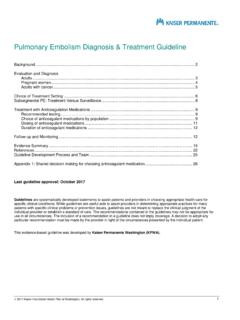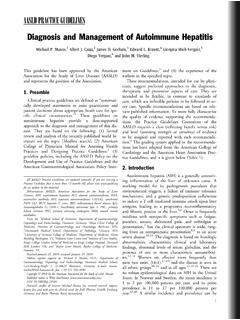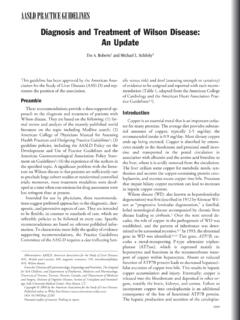Transcription of North of Tyne/Gateshead guidelines for detection ...
1 North of Tyne/Gateshead guidelines for detection , management and referral of adults with kidney disease An electronic version of this document can also be viewed / downloaded from the North of tyne and gateshead Area Prescribing Committee Website at: Endorsed for use within North Tyneside, Northumberland, Newcastle and gateshead by the North of tyne and gateshead APC March 2017 Review date Medicines Use and Guideline Group recommended review date: March 2019 Membership of the guideline development group The following were consulted on the review of the 2009 approved guidance: S Bennett, Consultant in Diabetes, NHCT R Cooper, GP, Newcastle gateshead CCG S Eaton, Consultant in Diabetes, NHCT R Fraser, Renal Pharmacist, NuTH D Kennedy, Consultant Clinical Biochemist, GHNT S Kirk, Cardiovascular GP Lead, Newcastle gateshead CCG S Llewellyn, Pharmacist, Newcastle gateshead CCG M Lowery, Formulary Pharmacist, NuTH S Marshall, Professor of Diabetes, NuTH F Naylor, GP, Northumberland CCG D Neely, Consultant Clinical Biochemist, NuTH T Page, Consultant Urologist, NuTH J Perry, GP, Northumberland CCG M Redpath, Consultant Clinical Biochemist, NHCT D Rix, Consultant Urologist, NuTH J Skinner, Consultant Community Cardiologist, NuTH C Sprake, GP, North Tyneside CCG C Tomson, Consultant Nephrologist.
2 NuTH S Tulip, Newcastle gateshead CCG J Weaver, Consultant in Diabetes, GHNT If any of the internet links in this document cease to function, they have all been downloaded and saved in a Word File, available on Google Documents and Dropbox. Date approved: March 2017 Review date: extended to December 20211 North of Tyne/Gateshead guidelines for detection , management and referral of adults with kidney disease Contents North of Tyne/Gateshead guidelines for detection , management and referral of adults with kidney disease .. 1 Introduction .. 2 2 Abbreviations used in this document .. 3 Summary of reasons to consider referral to Secondary care .. 4 Summary of monitoring and management of CKD and AKI .. 5 Definition and classification of CKD .. 7 Frequency of monitoring of CKD, according to CKD stage.
3 8 Management of patients with chronic kidney disease .. 9 Anaemia 10 Blood pressure management .. 11 Changes in kidney function during ACEI/ARB/diuretic treatment in primary care .. 12 Potassium management .. 13 Bone disease management in CKD .. 15 detection of haematuria .. 16 Acute Kidney 18 Management of patients who have had AKI .. 19 Laboratory measurements relating to kidney disease .. 20 Interpretation of measurements of serum creatinine and eGFR .. 21 Monitoring and referral of patients with CKD to 22 Resources for patients .. 26 2 Introduction The previous North of tyne guidelines were issued in April 2009 and were due for review in January 2012. Several national guidelines have been updated since that time, both on chronic kidney disease (CKD) and on acute kidney injury (AKI).
4 The current revision aims to ensure that these guidelines are implemented within the local context and to include gateshead . The guideline applies to adults (aged 18y). It is a guideline, and as with all guidelines , its use should be interpreted in the clinical context: no guideline can cover all clinical situations. It is written for healthcare professionals and is designed to support shared decision-making, but is not a substitute for the provision of personalised information about the risks and benefits of a particular decision, and cannot take fully into account the values and preferences of individual patients. Although most CKD is associated with age- and hypertension-related kidney damage, and most AKI reflects acute intercurrent illness, it remains vital that glomerulonephritis, interstitial nephritis, and renal involvement in systemic vasculitis are recognised and referred without delay.
5 If in doubt, GPs should seek advice from the Renal Unit by fax or letter. Letters should contain all relevant clinical information, including current and past drug treatment, all previous measurements of serum creatinine and eGFR (using the cumulative results function in ICE NB nephrologists can only access one result at a time on ICE OpenNet), and the question to be answered. The renal SpR on call should only be telephoned for advice when emergency admission directly to the renal ward is being considered. The guideline draws on NICE guidelines and other national guidelines . Disclaimer In making recommendations for drug treatment, it is assumed that clinicians will exclude contraindications and interactions, referring to the BNF and local formularies as necessary, when managing individual patients.
6 3 Abbreviations used in this document ACEI: Angiotensin Converting Enzyme Inhibitor ACR: Albumin:Creatinine Ratio ADHF: Acute Decompensated Heart Failure ADPKD: Autosomal Dominant Polycystic Kidney Disease AKI: Acute Kidney Injury ARB: Angiotensin II Receptor Blocker BKPA: British Kidney Patient Association BMD: Bone Mineral Density BP: Blood Pressure CCB: Calcium Channel Blocker CKD: Chronic Kidney Disease CKD-EPI: Chronic Kidney Disease EPIdemiology collaboration CVD cardiovascular disease DEXA: Dual Energy Xray Absorptiometry eGFR: estimated Glomerular Filtration Rate (in ml/ ) ESC: European Society of Cardiology FRAX: Fracture Risk Assessment Tool Hb: Haemoglobin JVP: Jugular Venous Pressure MDRD: Modification of Diet in Renal Disease MRA: Mineralocorticoid Receptor Antagonist NHSE: NHS England NICE: National Institute of Health and Care Excellence NSAID: Non-Steroidal Anti-Inflammatory Drug PCR: Protein:Creatinine ratio POCT: Point of Care Testing SIADH: Syndrome of Inappropriate AntiDiuretic Hormone secretion U&E: Urea, Creatinine and Electrolytes UTI: Urinary Tract Infection 4 Summary of reasons to consider referral to Secondary care For immediate admission (usually via local general medical take) 1.
7 Suspected systemic vasculitis with renal involvement 2. Acute Kidney Injury stage 3 3. Severe hyperkalaemia (serum K > mmol/L) 4. Accelerated hypertension (BP > 180/110 mmHg with signs of papilloedema or retinal haemorrhage). (NB patients with suspected phaeochromocytoma (labile or postural hypotension, headache, palpitations, pallor and sweating) should ideally be admitted to the local Endocrine unit) For urgent outpatient review 5. Nephrotic syndrome oedema, hypoalbuminaemia, and heavy proteinuria 6. Recent Acute Kidney Injury stage 1-2 not attributable to sepsis, hypovolaemia or hypotension For routine Nephrology outpatient review 7. Chronic kidney disease stage G4 or above ( eGFR < 30) 8. Sustained decrease in eGFR of 15, or of 25% if initial eGFR 60, within 12 months 9.
8 ACR >= 70 mg/mmol, unless known to be caused by diabetes and already appropriately treated ( already on the maximal tolerated dose of an ACEI or ARB) 10. 30% rise in serum creatinine (or 25% fall in eGFR) on initiation or up-titration of ACEI or ARB after exclusion of alternative causes hypovolaemia 11. Asymptomatic non-visible haematuria combined with urine albumin:creatinine ratio > 30 mg/mmol, irrespective of eGFR Anaemia (Hb < 105 g/L) in the presence of CKD stage G3a-G5 after exclusion of other causes and after a trial of oral iron unless serum ferritin is already > 100 micg/L and transferrin saturation > 20%; or if oral iron not tolerated. For review in the renal genetics clinic 12. Suspected metabolic stone disease (see flow chart) 13. Suspected or proven polycystic kidney disease 14.
9 Suspected inherited renal disorder, including renal tubular acidosis, congenital abnormality of the kidney and urinary tract, familial haematuria Consider referral for specialist review 15. Resistant hypertension (BP > 140/90 mmHg despite maximal tolerated doses of a 3-drug combination according to the NICE AB/CD algorithm) 16. Early onset hypertension without obvious cause (age < 40y) These are guidelines , not rules. The value added from referral may relate to current management, or to advanced decision- making, particularly amongst those at risk of progression to CKD stage G5. Please phone the Renal Specialist Registrar on call only to seek urgent admission. If admission is required, depending on the clinical situation and the bed state, you may be asked to send the patient to your local Ambulatory Care facility, Emergency Department, or the Emergency Admissions Suite at the Freeman Hospital.
10 For all other questions, send a request for Advice and Guidance or a referral letter. 5 Summary of monitoring and management of CKD and AKI diagnosis and classification of Chronic Kidney Disease Use the NICE CKD classification to classify CKD (see table 1). Measurement of eGFR and of urine albumin:creatinine ratio eGFR should be measured at least annually in patients taking ciclosporin patients taking tacrolimus patients taking lithium patients taking regular non-steroidal anti-inflammatory drugs eGFR and ACR should be measured at least annually in patients with chronic kidney disease patients with diabetes patients with hypertension patients with cardiovascular disease patients with a history of acute kidney injury within the past 3 years patients with multisystem disease with potential renal involvement, SLE, vasculitis patients with structural renal tract disease, recurrent kidney stones.







